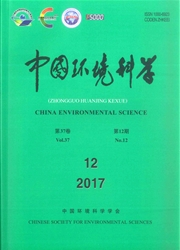

 中文摘要:
中文摘要:
该研究通过田间试验,以芸豆为试材,开展了喷施沼液对其生长、产量、病虫害和重金属含量影响的测试,并采用目标危险系数法(THQ)评价了芸豆果实中重金属的健康风险。结果表明,喷施沼液促进了芸豆植株根系发育,果实籽粒生长,提高果实数量,降低了芸豆锈病和细菌性疫病发病率,减少了二十八星瓢虫的啃食作用,增加了果实产量,增产幅度为17.6%。芸豆果实样品中检测了5种重金属,其中Zn、Cu、Cr、Cd4种重金属含量范围分别为31.93-38.88mg/kg、5.56-8.29mg/kg、0.64-1.29mg/kg和0.09-0.15mg/kg,未检测到Pb,喷施沼液芸豆中重金属含量满足《食品中污染物限量》(GB2762-2005)规定。总目标危险系数显示食用喷施沼液的芸豆不存在明显的健康风险,但儿童潜在健康风险高于成人,城市人群高于农村人群。
 英文摘要:
英文摘要:
Effects of biogas slurry spraying on plant growth, yield, disease and insect pest situation, and heavy metals residue of kidney bean were studied in field trials. Results showed that biogas slurry spraying facilitated root growth, increased fruit amount, strengthened resistance to common bacterial blight in common beans (Xanthomonas campestris) and the common bean rust disease (Uromyces appendiculatus), and reduced chewing of the 28--spotted potato ladybird (Henose- pilachna vigintioctopunctata). An increase about 17.6% in the yield of kidney bean was obtained. In kidney bean samples, Pd was not detected, and concentrations for Zn,Cu, Cr, Cd were observed in the range of 31.93-38.88 mg/kg, 5.56-8.29 mg/kg, 0.64-1.29 mg/kg, 0.09-0.15 mg/kg respectively. Levels of heavy metals after biogas slurry spraying were below maximum levels of Contaminants Limit in Foods of GB 2762-2005. Analysis of total target hazard quotient(TTHQ) showed that kidney bean was edible without obvious health risks. However, potential health risk for child and urban population was higher than adult and rural population respectively.
 同期刊论文项目
同期刊论文项目
 同项目期刊论文
同项目期刊论文
 Discriminating Multiple Impacts of Biogas Residues Amendment in Selectively Decontaminating Chloroac
Discriminating Multiple Impacts of Biogas Residues Amendment in Selectively Decontaminating Chloroac Insights into aquatic toxicities of the antibiotics oxytetracycline and ciprofloxacin in the presenc
Insights into aquatic toxicities of the antibiotics oxytetracycline and ciprofloxacin in the presenc Adsorption mechanism-based screening of cyclodextrin polymers for adsorption and separation of pesti
Adsorption mechanism-based screening of cyclodextrin polymers for adsorption and separation of pesti 期刊信息
期刊信息
